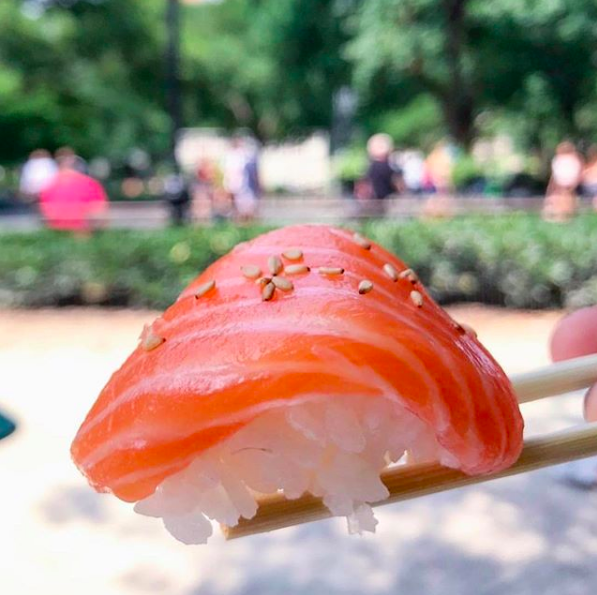Soy Into Sushi?
Although I try not to consume too much raw fish, sushi seems to be the holy grail when dining in Los Angeles! I feel like one of the biggest misconceptions of going out to eat is treating it like a treat. But eating out doesn’t always have to be indulgent, and there are healthy options everywhere you go!Going out to eat, enjoying good food with friends and having a glass of wine or a cocktail with friends is all a part of a balanced lifestyle. Like I always say, health is a holistic process and requires the right balance of mind and body. But instead of looking at the actual food as a treat, think about fueling your body with the right mix of essential vitamins and nutrients, and using food as nourishment.
Sushi in particular can actually be a pretty nutritious meal if you order the right things. Here are a few pro tips so you can enjoy, guilt-free!
- Keep it simple: rolls drenched in sauce are high in calories, sodium and fats. Stick to simple rolls and sashimi for lean protein and healthy fats
- Order healthy fats: Salmon is actually one of the healthier fish you can consume because it’s rich in Omega 3s and Fatty Acids. Adding avocado to your rolls is also a great way to consume your healthy fats. Avocados contain oleic acids, which make up the majority of the monounsaturated fats. Monounsaturated fats are the ‘good’ kinds of fat and can actually help to lower cholesterol, reduce inflammation, and have been linked to having positive effects on genes associated with cancer.
- Order your rolls with seaweed: Nori is rich in essential minerals like vitamin k, folate and iodine, and can aid in proper thyroid function
- Order edamame as an appetizer instead of miso soup; it contains substantially less sodium and one cup of edamame provides 17 grams of protein, a great healthy way to fill up!
Keep reading for nutrition benefits and learn what to order for your next sushi run!

BENEFITS
Salmon: 3.5 ounce portion of wild caught salmon contains:
- Omega-3 fatty acids: 2.6 grams. These are called essential vitamins because your body cannot produce them, and therefore you must consume them through diet
- Protein: 22-25 grams protein
- B Vitamins: Provide the following amounts of your recommended daily intake of B Vitamins
- Vitamin B1 (thiamin): 18%
- Vitamin B2 (riboflavin): 29%
- Vitamin B3 (niacin): 50%
- Vitamin B5 (pantothenic acid): 19%
- Vitamin B6: 47% of the RDI
- Vitamin B9 (folic acid): 7% of the RDI
- Vitamin B12: 51%
Edamame: One cup of edamame contains:
- Calcium: 10% daily recommended calcium
- Vitamin C: 16% vitamin C
- Iron: 20% iron
- Vitamin K 52% vitamin K
- Folate: 121% percent of the daily recommended folate
- Protein: Did you know Edamame is a complete source of dietary protein?
Avocados: 3.5 ounces of Avocado contains the following percent of one’s daily recommended value
- Vitamin K: 26%
- Folate: 20%
- Vitamin C: 17%
- Potassium: 14% (this is more than bananas!)
- Vitamin B5: 14%
- Vitamin B6: 13%
- Vitamin E: 10%
- Fiber: 27%
- It also provides vitamins A, B1 (thiamine), B2 (riboflavin) and B3 (niacin), manganese, copper, magnesium, zinc, iron, phosphorous and vitamins A, B1 (thiamine), B2 (riboflavin) and B3 (niacin).
- Calories: 160
- Protein: 2 grams
- Healthy fats: 15 grams
It’s a low-carb and healthy plant-based addition to your sushi!
Nori: 7 grams (1 tbsp) of dried spirulina contains:
- Riboflavin: 15% of the daily recommended intake
- Thiamin: 11% of the daily recommended intake
- Iron: 11% of the daily recommended intake
- Manganese: 7% of the daily recommended intake
- Copper: 21% the daily recommended intake
- Calories: 20
- Carbs: 1.7 grams
- Protein: 4 grams
- Fat: 0.5 gram
- Fiber: 0.3 grams
